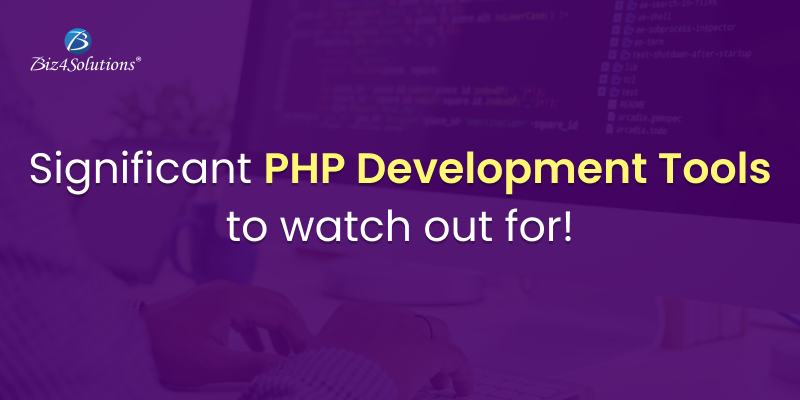
Hypertext Preprocessor, commonly known as PHP, happens to be one of the most widely used server-side scripting languages for developing web applications and websites. Renowned names like Facebook and WordPress are powered by PHP. The reasons for its popularity can be attributed to the following goodies PHP offers:
- Open-source and easy-to-use
- Comprehensive documentation
- Multiple ready-to-use scripts
- Strong community support
- Well-supported frameworks
However, to leverage this technology to the fullest and simplify tasks, PHP developers utilize certain tools that enhance programming efficiency and minimize development errors. PHP development tools provide a conducive IDE (Integrated Development Environment) that enhances the productivity of PHP web development.
The market currently is overflooded with PHP tools. Therefore, it becomes immensely difficult for PHP development teams to pick the perfect set of tools that will fulfill their project needs. This blog enlists the best PHP application development tools along with their offerings. A quick read will help you to choose the most befitting tool for your PHP development project.
Top PHP Software Development Tools

PHPStorm
PHPStorm, created and promoted by JetBrains, is one of the most standard IDEs for PHP developers. It is lightweight, smooth, and speedy. This tool works easily with popular PHP frameworks like Laravel, Symfony, Zend Framework, CakePHP, Yii, etc. as well as with contemporary Content Management Systems like WordPress, Drupal, and Magento. Besides PHP, this tool supports JavaScript, C, C#, Visual Basic, and C++ languages; and platforms such as Linux, Windows, and Mac OS X. This enterprise-grade IDE charges a license price for specialized developers, but is offered for free to students and teachers so that they can start open-source projects. Tech giants like Wikipedia, Yahoo, Cisco, Salesforce, and Expedia possess PHPStorm IDE licenses.
Features:
- Code-rearranging, code completion, zero-configuration, and debugging
- Support for Native ZenCoding and extension with numerous other handy plugins such as the VimEditor.
Functions:
- Provides live editing support for the leading front-end technologies like JavaScript, HTML5, CSS, TypeScript, Sass, CoffeeScript, Stylus, Less, etc.
- It supports code refactoring, debugging, and unit testing
- Enables a PHP developer to integrate with version control systems, databases, remote deployment, composer, vagrant, rest clients, command-line tools, etc.
- Coming to debugging, PHPStorm works with Xdebug and Zend Debugger locally as well as remotely.
Cloud 9
This PHP development tool is an open-source cloud IDE. It offers a development eco-system for PHP and numerous other programming languages like HTML5, JavaScript, C++, C, Python, etc. It supports platforms like Mac OS, Solaris, Linux, etc.
Features:
- Code reformatting, real-time language analysis, and tabbed file management.
- Availability of a wide range of themes
- In-built image editor for cropping, rotating, and resizing images
- An in-built terminal that allows one to view the command output from the server.
- Integrated debugger for setting a breakpoint
- Adjustable panels via drag and drop function
- Support for keyboard shortcuts resulting in easy access
Functions:
- With Cloud 9, one can write, run and debug the code using any browser. Developers can work from any location using a machine connected to the internet.
- It facilitates the creation of serverless apps, allowing the tasks of defining resources, executing serverless applications, and remote debugging.
- Its ability to pair programs and track all real-time inputs; enables one to share their development eco-system with peers.
Zend Studio
This commercial PHP IDE supports most of the latest PHP versions, specifically PHP 7, and platforms like Linux, Windows, and OS X. This tool boasts of an instinctive UI and provides most of the latest functionalities that are needed to quicken PHP web development. Zend Studio is being used by high-profile firms like BNP Paribas Credit Suisse, DHL, and Agilent Technologies.
Features:
- Support for PHP 7 express migration and effortless integration with the Zend server
- A sharp code editor supporting JavaScript, PHP, CSS, and HTML
- Speedier performance while indexing, validating, and searching for the PHP code
- Support for Git Flow, Docker, and the Eclipse plugin environment
- Integration with Z-Ray
- Debugging with Zend Debugger and Xdebug
- Deployment sustenance including cloud support for Microsoft Azure and Amazon AWS.
Functions:
- Enables developers to effortlessly organize the PHP app on more than one server.
- Provides developers the flexibility to write and debug the code without having to spare additional effort or time for these tasks.
- Provides support for mobile app development at the peak of live PHP applications and server system backend, for simplifying the task of harmonizing the current websites and web apps with mobile-based applications.
Eclipse
Eclipse is a cross-platform PHP editor and one of the top PHP development tools. It is a perfect pick for large-scale PHP projects. It supports multiple languages – C, C++, Ada, ABAP, COBOL, Haskell, Fortran, JavaScript, D, Julia, Java, NATURAL, Ruby, Python, Scheme, Groovy, Erlang, Clojure, Prolong, Lasso, Scala, etc. – and platforms like Linux, Windows, Solaris, and Mac OS.
Features:
- It provides one with a ready-made code template and automatically validates the syntax.
- It supports code refactoring – enhancing the code’s internal structure.
- It enables remote project management
Functions:
- Allows one to choose from a wide range of plugins, easing out the tasks of developing and simplifying complex PHP code.
- Helps in customizing and extending the IDE for fulfilling project requirements.
- Supports GUI as well as non-GUI applications.
Codelobster
Codelobster is an Integrated Development Environment that eases out and modernizes the PHP development processes. Its users do not need to worry about remembering the names of functions, attributes, tags, and arguments; as these are enabled through auto-complete functions. It supports languages like PHP, JavaScript, HTML, and CSS and platforms such as Windows, Linux, Ubuntu, Fedora, Mac OS, Linux, and Mint. Additionally, it offers exceptional plugins that enable it to function smoothly with myriad technologies like Drupal, Joomla, Twig, JQuery, CodeIgniter, Symfony, Node.js, VueJS, AngularJS, Laravel, Magento, BackboneJS, CakePHP, EmberJS, Phalcon, and Yii.
Offerings:
- It is an internal, free PHP debugger that enables validating the code locally.
- It auto-detects the existing server settings followed by configuring the related files and allowing one to utilize the debugger.
- It has the ability to highlight pairs of square brackets and helps in organizing files into the project.
- This PHP development tool displays a popup list comprising variables and constants.
- It allows one to hide code blocks that are presently not being used and to collapse the code for viewing it in detail.
Netbeans
Netbeans, packed with a rich set of features is quite popular in the realm of PHP development services. It supports several languages like English, Russian, Japanese, Portuguese, Brazilian, and simplified Chinese. Its recent version is lightweight and speedier, and specifically facilitates building PHP-based Web Applications with the most recent PHP versions. This PHP development tool is apt for large-scale web app development projects and works with the most trending PHP frameworks such as Symfony2, Zend, FuelPHP, CakePHP, Smarty, and WordPress CMS. It supports PHP, HTML5, C, C++, and JavaScript languages and Windows, Linux, MacOS, and Solaris platforms.
Features:
- Getter and setter generation, quick fixes, code templates, hints, and refactoring.
- Code folding and formatting; rectangular selection
- Smart code completion and try/catch code completion
- Syntax highlighter
DreamWeaver
This is one of the most popular PHP application software development tools. It assists one in creating, publishing, and managing websites. A website developed using DreamWeaver can be deployed to any web server.
Offerings:
- Ability to create dynamic websites that fits the screen sizes of different devices
- Availability of ready-to-use layouts for website development and a built-in HTML validator for code validation.
- Workspace customization capabilities
Aptana Studio
Aptana Studio is an open-source PHP development tool used to integrate with multiple client-side and server-side web technologies like PHP, CSS3, Python, RoR, HTML5, Ruby, etc. It is a high-performing and productive PHP IDE.
Features:
- Supports the most recent HTML5 specifications
- Collaborates with peers using actions like pull, push, and merge
- IDE customization and Git integration capabilities
- The ability to set breakpoints, inspect variables, and control the execution
Functions:
- Eases out PHP app development by supporting the debuggers and CLI
- Enables programmers to develop and test PHP apps within a single environment
- Leverages the flexibilities of Eclipse and also possesses detailed information on the range of support for each element of the popular browsers.
Final Verdict:
I hope this blog has given you clear visibility of the popular PHP tools used for web development and will guide you through selecting the right set of tools for your upcoming project. If you are a start-up or lack technical expertise in PHP application development, it’s advisable to hire an experienced PHP application development company for executing your project.








